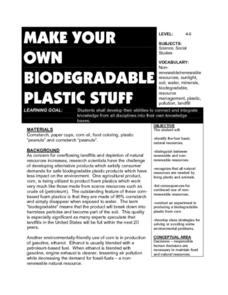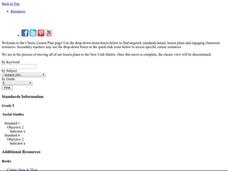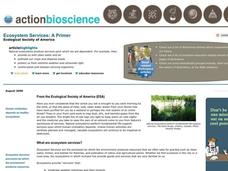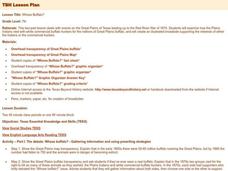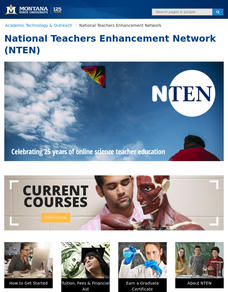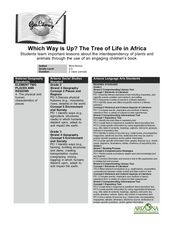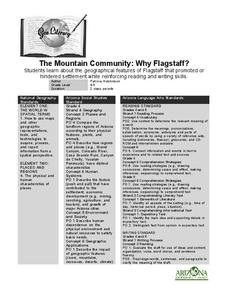Curated OER
Make Your Own Biodegradable Plastic Stuff
Students identify the four basic natural resources. They distinguish bettween renewable and non-renewable resources. Pupils recognize that all natural resources are needed by living plants and animals. Students list consequences for...
Dade Schools
Ancient Greece
What role does geography play in the development of a culture? How does ancient Greek culture still influence civilization today? These and other questions are explored in a unit study of Ancient Greece. The overview of the unit provided...
Rural Science Education Program
Bees and Flowers – Partners in Pollination
Why are bees so important? After several activities where kids investigate the form and function of flowers, they learn about the different types of bees and label them. They then examine pollen under a microscope and decide which bees...
Curated OER
King Cotton
Fifth graders explore the cotton plant. For this cotton lesson, 5th graders research the process of growing cotton. Students explore the economic and cultural differences in the states that grew cotton for trade and industry.
Curated OER
Sticks, Stones, Sinews and Stuff: How Early People Used the Environment to Meet Basic Needs
Students create an artifact. In this early survival instructional activity, students use found objects to create an artifact that could have been used to help early people meet their basic needs.
Curated OER
Shedding Light on Watersheds
High schoolers discuss what a watershed is, complete online activities showing them how to take care of a watershed, and create a model of a watershed that they experiment with to see what happens when it is disrupted by civilization.
Curated OER
Kansas Ponds, Lakes & Reservoirs
Students compare the ponds, lakes, and reservoirs of Kansas. In this geography instructional activity, students use Google Earth to research the different ponds, lakes, and reservoirs in Kansas. Students will discover that many of the...
Curated OER
How Much Is an Ecosystem Worth?
Students examine the value of ecosystems. They read and analyze an article, evaluate ecosystem services, research the benefits of biomonitors, and design a public service announcement.
Michigan Sea Grant
Environmental Decision Making
Pupils participate in a board game activity in which landing on a space called "Decision Card" presents them with a land-use situation to consider and decide how to act. In order to advance in Hydropoly, players must think critically and...
Curated OER
America's Heartland
Fifth graders investigate imports and exports to discover its importance to America as a world power. In this Imports and exports lesson, 5th graders discuss how climate and natural resources aid a country in becoming a world power....
Curated OER
Recycle, Reduce, Reuse and Save a Tree
Students examine how to save and protect trees. In this conservation lesson, students read books about the usefulness of trees, write ideas in their journals about how trees can be used, and make a book of ways to protect trees.
Curated OER
Whose Buffalo?
Seventh graders examine how the Plains Indians vied with white commercial buffalo hunters for the millions of Great Plains buffalo. They create an illustrated broadside supporting the interests of either the Indians or the commercial...
Curated OER
All the President's Men and Women
Students research responsibilities, programs and government departments of leaders that make up the presidential cabinet, in the form of a Web Exploration, after reading "Dueling Power Centers" from The New York Times.
Curated OER
To Fish or Not to Fish?
Students demonstrate the decision-making process for marine reserves designations. In this role-playing lesson students analyze maps and data relating to a proposed reserve. They formulate the best decisions based on overall issues.
Curated OER
What's Holding Up the Water?
Students read about the history and locate dams in Arizona. In this Arizona dams lesson plan, students write a summary about what they read focusing on word choice, ideas, conventions, and geography content.
Curated OER
Demonstrating Erosion in Action
Students easure and record volume of water, then measure and record mass of soil. They explain the effects of the following in controlling erosion: Contouring, cover crop, strip cropping, reforestation, inter-seeding.
Curated OER
The Carter Center’s Work in Sub-Saharan Africa
Students explore the state of Sub-Saharan Africa. In this geography skills lesson, students examine the work of the Carter Center in Africa as they investigate the strengths and weaknesses of linguistic, tribal, and religious diversity.
Curated OER
Which Way is Up? The Tree of Life in Africa
Students read a book titled This is the Tree about a baobab tree and draw a picture and label the tree. In this tree lesson plan, students also write a paragraph explaining why they drew that tree.
Curated OER
"I've Been Working on the Railroad" - Federal Land Grants and the Construction of the Illinois Central Railroad in Mid-nineteenth Century Illinois
Eleventh graders, in groups, design a self-sufficient community. Groups present the communities they've designed. They compare and contrast the communities presented. They research the theories of Johann Heinrich von Thunen online and...
Curated OER
Oil Spill
Fourth graders watch a video about the types of products made from oil or oil used as energy to produce the product. In groups, they identify the positive and negative aspects of oil and participate in various activities. They use the...
Curated OER
The Rotten Truth
Fourth graders watch a video about how much solid waste is produced by each person and how it is disposed of. Using the internet, they identify and interpret data on the type of trash thrown out the most. They offer possible solutions...
Curated OER
Slavery, Manumission, and Freedom: Free Blacks in Charleston before the Civil War
Students explore the concept of slavery and manumission through a variety of activities. In this civil rights lesson, students gather information from primary sources, then analyze the politics and historical context of the time....
Curated OER
Is Climate Change Good for Frogs?
Students fill out a chart on how climate change would affect them and things around them. In this climate change lesson plan, students discuss how global warming affects them and amphibians and then fill out the chart that goes with it.
Curated OER
The Mountain Community: Why Flagstaff?
Students identify geographical features that hindered or promoted settlement in the city of Flagstaff, Arizona. In this settlement lesson plan, students write a summary of what they learned and identify geographical features on a map.


